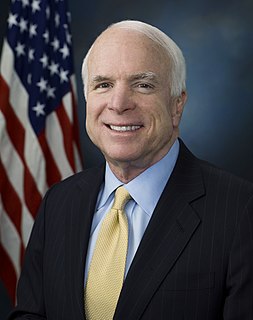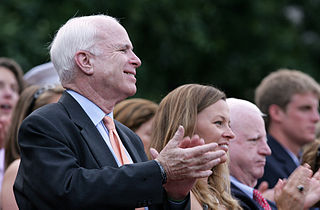 W
WJohn Sidney McCain III was an American politician and US Navy officer, who served as a United States Senator for Arizona from 1987 until his death in 2018. He previously served two terms in the United States House of Representatives and was the Republican nominee for president of the United States in the 2008 election, which he lost to Barack Obama.
 W
WThe 1986 United States Senate election in Arizona was held on November 4, 1986. Incumbent Republican U.S. Senator Barry Goldwater decided to retire instead of seeking a sixth term. The open seat was won by John McCain, a Republican congressman and former Navy officer who remained in the Senate until his death on August 25, 2018.
 W
WThe 1992 United States Senate election in Arizona was held on November 3, 1992. Incumbent Republican U.S. Senator John McCain won re-election to a second term.
 W
WThe 1998 United States Senate election in Arizona was held November 3, 1998. Incumbent Republican U.S. Senator John McCain won re-election to a third term.
 W
WThe 2004 United States Senate election in Arizona took place on November 2, 2004 alongside other elections to the United States Senate in other states as well as elections to the United States House of Representatives and various state and local elections. Incumbent Republican U.S. Senator John McCain won re-election to a fourth term with his largest victory as a U.S. senator.
 W
WThe 2010 United States Senate election in Arizona took place on November 2, 2010, along with other elections to the United States Senate in other states as well as elections to the United States House of Representatives and various state and local elections. The primaries were held on August 24, 2010. Incumbent Republican U.S. Senator John McCain, who returned to the Senate after losing the presidency to then-Illinois Senator Barack Obama in the 2008 presidential election, ran for reelection to a fifth term and won.
 W
WThe 2016 United States Senate election in Arizona was held on November 8, 2016, to elect a member of the U.S. Senate to represent the State of Arizona, concurrently with the 2016 U.S. presidential election, as well as other elections to the Senate in other states and elections to the U.S. House of Representatives and various state and local elections.
 W
WThe Bipartisan Campaign Reform Act of 2002 is a United States federal law that amended the Federal Election Campaign Act of 1971, which regulates the financing of political campaigns. Its chief sponsors were senators Russ Feingold (D-WI) and John McCain (R-AZ). The law became effective on 6 November 2002, and the new legal limits became effective on January 1, 2003.
 W
WCampaign Legal Center (CLC) is a nonpartisan 501(c)(3) that works to reduce the influence of money in politics and to support unrestricted access to voting.
 W
WSenator John McCain's personal character has dominated the image and perception of him. His family's military heritage, his rebellious nature as a youth, his endurance over his treatment as a prisoner of war, his resulting physical limitations, his political persona, his well-known temper, his admitted propensity for controversial or ill-advised remarks, and his devotion to maintaining his large blended family have all defined his place in the American political world more than any ideological or partisan framing.
 W
WJohn McCain was the senior United States Senator from Arizona and 2008 Republican nominee for President of the United States. McCain was involved in many elections on local, statewide and nationwide stage since his first election to the United States House of Representatives in 1982.
 W
WThe Honest Ads Act is a bill in the United States Senate legislative body to promote regulation of campaign advertisements online by online companies such as Facebook and Google. The act is a bipartisan bill sponsored by Senators Amy Klobuchar (D), Mark Warner (D), and John McCain (R). The bill was proposed on October 19, 2017, as a response to investigation regarding Russia purchasing political ads during the United States 2016 presidential election. There is also a companion version to this bill in the House of Representatives, HR 4077, sponsored by Representative Derek Kilmer.
 W
WUSS John S. McCain (DDG-56) is an Arleigh Burke-class destroyer currently in the service of the United States Navy. She is part of the Destroyer Squadron 15 within the Seventh Fleet, and has her homeport at the Yokosuka Naval Base in Yokosuka, Japan.
 W
WUSS John S. McCain (DL-3/DDG-36), originally designated DD-928 but reclassified in 1951 as a Destroyer Leader, was the second Mitscher-class destroyer in the United States Navy. The ship was launched by Bath Iron Works Corporation, Bath, Maine, on 12 July 1952. She was sponsored by Roberta McCain, the daughter-in-law of Admiral John S. McCain, Sr., and commissioned on 12 October 1953 at the Boston Naval Shipyard, with Commander E. R. King, USN, in command.
 W
WThe Keating Five were five United States Senators accused of corruption in 1989, igniting a major political scandal as part of the larger savings and loan crisis of the late 1980s and early 1990s. The five senators—Alan Cranston, Dennis DeConcini, John Glenn, John McCain, and Donald W. Riegle, Jr. —were accused of improperly intervening in 1987 on behalf of Charles H. Keating, Jr., Chairman of the Lincoln Savings and Loan Association, which was the target of a regulatory investigation by the Federal Home Loan Bank Board (FHLBB). The FHLBB subsequently backed off taking action against Lincoln.
 W
WThis is a list of bills sponsored by John McCain in the United States Senate.
 W
WU.S. Senator John McCain (R-AZ), a member of the U.S. Congress from 1983 until his death in office in 2018, a two-time U.S. presidential candidate, and the nominee of the Republican Party in the 2008 U.S. Presidential election, took positions on many political issues through his public comments, his presidential campaign statements, and his senatorial voting record.
 W
WThe McCain Institute for International Leadership is a Washington, D.C.-based think tank in cooperation with Arizona State University whose mission is to "advance leadership based on security, economic opportunity, freedom, and human dignity, in the United States and around the world." The institute was formed in 2012 and is named after U.S. Senator and 2008 Republican Party presidential nominee John McCain from Arizona. Based in Washington, D.C., the McCain Institute is part of Arizona State University. The executive director of the McCain Institute is Mark Green, former U.S. ambassador to Tanzania and administrator of the United States Agency for International Development.
 W
WThis article lists those who were potential candidates for the Republican nomination for Vice President of the United States in the 2008 election. On March 4, 2008, Senator John McCain of Arizona won a majority of pledged delegates for the Republican nomination for President of the United States, and became the presumptive nominee.
 W
WJohn McCain ran for US president in the 2000 presidential election, but failed to gain the Republican Party nomination, losing to George W. Bush in a campaign that included a bitter battle during the South Carolina primary. He resumed his role representing Arizona in the U.S. Senate in 2001, and Bush won the election. Bush was President of the United States from 2001 to 2009. McCain won re-election to the Senate in 2004, 2010 and 2016.